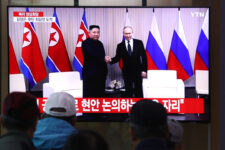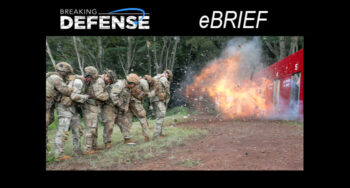 Washington: The Marine Corps is eyeing a wide range of systems to augment the service’s radio network, thrown into doubt by the Army’s recent decision to cancel its main ground radio.
Washington: The Marine Corps is eyeing a wide range of systems to augment the service’s radio network, thrown into doubt by the Army’s recent decision to cancel its main ground radio.
These potential replacements are based on current communication systems, modified “on the battlefield” by combat units deployed in Iraq, Afghanistan and elsewhere, James Craft, deputy chief information officer for the Marine Corps, said.
Craft declined to provide specifics on what those systems were and how they would replace the JTRS Ground Mobile Radio (GMR). He spoke at a luncheon sponsored by the Armed Forces Communications and Electronics Association.
Craft did provide one detail: network security would be the top priority in any solution the Marines end up putting in the field. “From the Marine Corps point of view, if it isn’t secure, we are not interested,” Craft told the industry attendees at Wednesday’s event.
The JTRS replacement would have to be energy efficient, Craft pointed out. Resupplying batteries and other power sources needed to make JTRS and other systems work in the field has become an increasingly dangerous task, Craft said. Supply convoys are constant targets for enemy attacks, either by improvised roadside bombs or preplanned ambushes by insurgent forces.
The longer Marine units can use things like JTRS on the battlefield without having to rely on new shipments of batteries or other supplies, the less number of convoys combat commanders have to send into harms way. “We need to be more efficient than our enemies,” Craft said.
Earlier this month, the Army scrapped its plans to deploy the GMR and announced it would be restarting its competition for a new tactical radio. The Marines also planned to purchase a number of the radios for their combat units, along with the Army.
This is not the first time the Marines, or the other services, have been forced to come up with new communication systems because of delays to JTRS. In mid-2000, the Pentagon granted millions in development waivers to the services, so they could build temporary communication systems for troops who had expected the new radios to already be in service.
With this latest setback, the Marines and the Army are again being forced back to the drawing board, to find a way to work around the JTRS program.
Everything comes down to Ukraine: 5 stories from Europe in 2024
Of all that happened during the Ukraine conflict in the last 12 months, the deployment of North Korean troops to the Russian border territory of Kursk stands out from the pack.


























